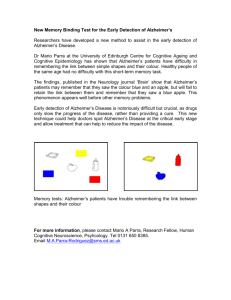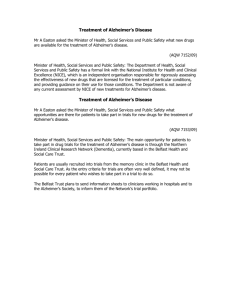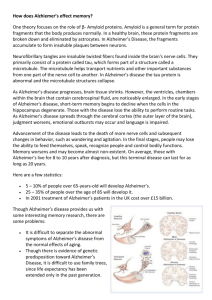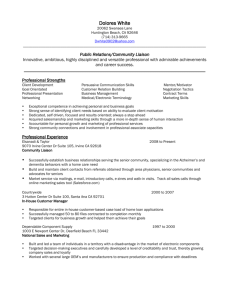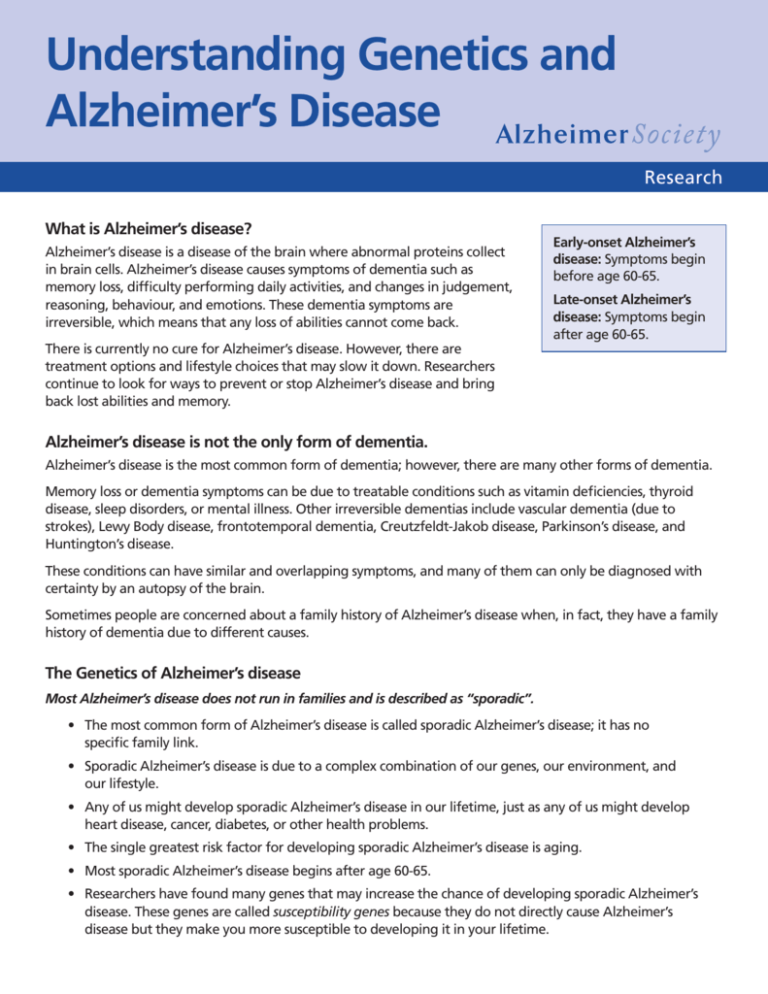
Understanding Genetics and
Alzheimer’s Disease
Research
What is Alzheimer’s disease?
Alzheimer’s disease is a disease of the brain where abnormal proteins collect
in brain cells. Alzheimer’s disease causes symptoms of dementia such as
memory loss, difficulty performing daily activities, and changes in judgement,
reasoning, behaviour, and emotions. These dementia symptoms are
irreversible, which means that any loss of abilities cannot come back.
There is currently no cure for Alzheimer’s disease. However, there are
treatment options and lifestyle choices that may slow it down. Researchers
continue to look for ways to prevent or stop Alzheimer’s disease and bring
back lost abilities and memory.
Early-onset Alzheimer’s
disease: Symptoms begin
before age 60-65.
Late-onset Alzheimer’s
disease: Symptoms begin
after age 60-65.
Alzheimer’s disease is not the only form of dementia.
Alzheimer’s disease is the most common form of dementia; however, there are many other forms of dementia.
Memory loss or dementia symptoms can be due to treatable conditions such as vitamin deficiencies, thyroid
disease, sleep disorders, or mental illness. Other irreversible dementias include vascular dementia (due to
strokes), Lewy Body disease, frontotemporal dementia, Creutzfeldt-Jakob disease, Parkinson’s disease, and
Huntington’s disease.
These conditions can have similar and overlapping symptoms, and many of them can only be diagnosed with
certainty by an autopsy of the brain.
Sometimes people are concerned about a family history of Alzheimer’s disease when, in fact, they have a family
history of dementia due to different causes.
The Genetics of Alzheimer’s disease
Most Alzheimer’s disease does not run in families and is described as “sporadic”.
• The most common form of Alzheimer’s disease is called sporadic Alzheimer’s disease; it has no
specific family link.
• Sporadic Alzheimer’s disease is due to a complex combination of our genes, our environment, and
our lifestyle.
• Any of us might develop sporadic Alzheimer’s disease in our lifetime, just as any of us might develop
heart disease, cancer, diabetes, or other health problems.
• The single greatest risk factor for developing sporadic Alzheimer’s disease is aging.
• Most sporadic Alzheimer’s disease begins after age 60-65.
• Researchers have found many genes that may increase the chance of developing sporadic Alzheimer’s
disease. These genes are called susceptibility genes because they do not directly cause Alzheimer’s
disease but they make you more susceptible to developing it in your lifetime.
• The role of specific environmental factors in developing sporadic Alzheimer’s disease is unclear. Some
studies show that it may be possible to decrease the likelihood of sporadic Alzheimer’s disease by
keeping your mind active, avoiding head injury, reducing vascular disease risk factors, and effectively
managing stress and depression.
• Research has not confirmed whether specific vitamins, substances or supplements can prevent or
slow down Alzheimer’s disease. Before trying any of these, be sure to discuss the possible risks and
benefits with your doctor.
• Sporadic Alzheimer’s disease usually does not run in families. However, people who have a family
history of sporadic Alzheimer’s disease have a greater chance of developing the disease than people
with no family history of Alzheimer’s disease.
Rare cases of Alzheimer’s disease are inherited or “familial”.
• Families with this rare form of Alzheimer’s disease have very strong family histories of Alzheimer’s
disease (many family members over many generations).
• Familial Alzheimer’s disease has the same symptoms as sporadic Alzheimer’s disease and can develop
at any age.
• Familial Alzheimer’s disease accounts for less than 5% of all cases of Alzheimer’s disease.
• Familial Alzheimer’s disease is due to changes or alterations in specific genes that can be directly
passed on from parent to child.
• Three familial Alzheimer’s disease genes have been discovered so far: the PS1, PS2, and APP genes.
If you have an alteration in any one of these genes, you will almost certainly develop early-onset
familial Alzheimer’s disease.
• Alterations in the PS1, PS2, and APP genes are not known to cause late-onset familial Alzheimer’s
disease.
• Researchers are searching for other genes that might cause familial Alzheimer’s disease.
• Familial Alzheimer’s disease runs in families. If a person has familial Alzheimer’s disease, each
of his/her children has a 50% chance of inheriting the disease-causing gene and developing
Alzheimer’s disease.
Is there genetic testing for Alzheimer’s disease?
For most of us, there is no genetic test that can definitely tell us whether we
will develop Alzheimer’s disease or not.
Genetic testing for sporadic Alzheimer’s disease is not recommended.
Researchers have identified more than 30 different susceptibility genes
for sporadic Alzheimer’s disease. However, a susceptibility gene called the
APOE4 gene is believed to have the greatest impact on a person’s chances of
developing sporadic Alzheimer’s disease.
Some people who are concerned about developing sporadic Alzheimer’s
disease might be interested in finding out if they carry an APOE4 gene.
Advisory committees around the world have recommended against this type
of genetic testing. This is because individuals who have an APOE4 gene might
never develop Alzheimer’s disease and individuals with no APOE4 genes can
still develop Alzheimer’s disease.
2
© August 2014, Alzheimer Society of Canada. All rights reserved. Direct-to-consumer
genetic testing: Some
internet companies
provide APOE4 genetic
testing. Experts caution
against using these
services. If you are
considering any kind of
genetic testing, make sure
you talk to your doctor
or a genetic counsellor
beforehand.
Understanding Genetics and Alzheimer’s Disease
Genetic testing for familial Alzheimer’s disease is available in some cases.
Genetic testing is only an option for families that have early-onset
familial Alzheimer’s disease.
If you are interested in genetic testing for early-onset familial Alzheimer’s
disease, the first step of this process should be a detailed review of your
family history by a genetic counsellor or physician to make sure that your
family fits the pattern of early-onset familial Alzheimer’s disease (several
family members with Alzheimer’s disease beginning before the age of
60-65). These families are rare.
If your family fits the early-onset familial Alzheimer’s disease pattern, a
sample of DNA (genetic material) would need to be taken from a family
member who has been diagnosed with early-onset Alzheimer’s disease.
This DNA sample would then be tested for alterations in the three known
early-onset familial Alzheimer’s disease genes.
If this family member is found to have an alteration in one of the three
early-onset familial Alzheimer’s disease genes, other relatives can choose
to have genetic testing to find out if they carry the same alteration,
even if they have no symptoms of Alzheimer’s disease. This is called
presymptomatic or predictive genetic testing. This testing can only be
done after meeting with a genetic counsellor to review all the risks and
benefits.
Testing of the three known early-onset familial Alzheimer’s disease
genes can be done at Canadian research laboratories or commercial
laboratories in the United States. (Commercial testing is costly and may
not be covered by your provincial healthcare plan.)
There is a lot to think about
before having a genetic
test for familial Alzheimer’s
disease, including:
• Motivations: Why do
you want the test? Will it
change life decisions such as
financial planning or having
children?
• Informed consent: Do you
fully understand what
the test will and will not
tell you? Do you fully
understand the possible
benefits and risks of having
the test?
• Confidentiality: Will your
test results be kept private?
Who will you share them
with?
• Risks: Will the test results
affect family relationships?
Your mental or emotional
wellbeing? Insurance or
employment applications?
Help is available
If you are thinking about genetic testing for Alzheimer’s disease it is important to get help from a health care
professional like your doctor or a certified genetic counsellor. They will help you find out whether genetic
testing is relevant for you based on your family history. If it is relevant, they will also help make sure you
understand the testing process and all the things you should think about before getting tested.
For more information about genetic testing, please contact your local Alzheimer Society, your family doctor,
or the Canadian Association of Genetic Counsellors (www.cagc-accg.ca).
This document is for information only; it is not intended to replace the advice of a health care professional.
Understanding Genetics and Alzheimer’s Disease
© August 2014, Alzheimer Society of Canada. All rights reserved. 3
References
Bird TD, “Alzheimer Disease Overview”, GeneReview (revised April 2014).
Bird TD, “Early-Onset Familial Alzheimer Disease”, GeneReview (revised October 2012).
Beier MT, “Alzheimer’s disease: Epidemiology and risk factors”, University of Tennessee Advanced Studies in
Pharmacy, ASIP, Volume 2 (2005).
Ertekin-Taner N, “Genetics of Alzheimer’s disease: A centennial review”, Neurologic Clinics 25: 611-667 (2007).
Sadovnick AD, “Genetic counselling and genetic screening for Alzheimer’s disease and other dementias”,
Canadian Journal of Neurological Sciences, Supplement 1: 52-5 (February 2001).
“The incidence of dementia in Canada. The Canadian Study of Health and Aging Working Group”, Neurology
55: 66-73 (July 2000).
“Statement on Use of Apolipoprotein E Testing for Alzheimer Disease”, Journal of the American Medical
Association, 274 (November 1995).
Crean S et al., “Apolipoprotein E ε4 Prevalence in Alzheimer’s Disease Patients Varies across Global Populations:
A Systematic Literature Review and Meta-Analysis”, Dementia and Geriatric Cognitive Disorders 31: 20-30
(2011).
Saunders AM et al., “Association of apolipoprotein E allele ε4 with late‐onset familial and late-onset Alzheimer’s
disease”, Neurology 43 - 8: 1467 (August 1993).
The contents of this document are provided for information purposes only and do not represent advice, an endorsement
or recommendation, with respect to any product, service or enterprise, and/or the claims and properties thereof, by the
Alzheimer Society of Canada. This information sheet is not intended to replace clinical diagnosis by a health professional.
Alzheimer Society of Canada
20 Eglinton Avenue West, 16th Floor, Toronto, Ontario, M4R 1K8
Tel: 416-488-8772 • 1-800-616-8816 • Fax: 416-322-6656
E-mail: info@alzheimer.ca • Website: www.alzheimer.ca
Facebook : www.facebook.com/AlzheimerSociety • Twitter : www.twitter.com/AlzSociety
© August 2014, Alzheimer Society of Canada. All rights reserved.
R300-15E 2015


